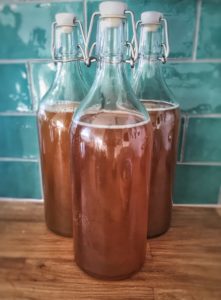Fermented foods are foods that have undergone a conversion process via microorganisms/bacteria. Sugar is ultimately converted into alcohol, organic acids, or carbon dioxide. The conversion process is used in several ways: for leavening, food & flavor preservation, and alcohol production.
Mankind has been fermenting foods for thousands of years. What was once a necessary process of preservation is now revered for numerous health and wellness benefits (to say nothing of incredible flavor!).
Fermented foods have enjoyed a serious resurgence thanks to today’s prevalent foodie culture (pun intended). Favored by chefs, supported by numerous global cuisines, and enjoyed by health food enthusiasts everywhere, fermented foods and beverages are widely available.
Health Benefits of Fermented Foods
Fermented foods are a source of the good bugs that help the gut biome to process foods, absorb nutrients, secrete helpful enzymes and maintain balance. The best fermented foods for your health are probiotic and contain active culture and can introduce healthy bacteria into the gut biome.

Kombucha, or fermented tea, is a healthy and delicious probiotic beverage.
Not all fermentation is created equal. Probiotic benefits are gained from live organisms, so food and beverages that are pasteurized or have the fermentation process halted during production may have little benefit. Sadly, beer and wine don’t boast any particularly valuable probiotic qualities.
Be aware that not all of the products sold in supermarkets with the same name as traditional fermented foods contain active culture. If you read the ingredient list on some brands of soy sauce, for example, you will see ingredients such as “caramel color” while soy is not listed. These products are not fermented, are often highly processed, and are not the best choice for gut health.
Best Fermented Foods for Health
Plants
- Sauerkraut (cabbage)
- Kimchi (cabbage, vegetable & peppers)
- Kvass (fermented beverage made with beets)
- Pickles (unsweetened, and with live culture)
- Miso
- Non-dairy yogurt such as coconut or almond
- Fermented bean curd – tempeh & tofu are 2 examples
- Natto (fermented soy product from Japan)
- Poi (Polynesian fermented taro dish)
- Vinegar (with active culture such as Mother)
- Fermented hot sauce
- Fermented soy sauce
Breads
Any bread that is biologically leavened with yeast instead of baking powder is considered probiotic – the most beneficial is naturally leavened sourdough.
Animal (dairy)
- Kefir
- Yogurt
- Raw cheese (goat or cow)
Animal (meat)
- Fermented fish
- Fermented fish sauce
- Bagoong (fermented fish or shrimp dish from Philippines)
- Traditional salami
- Worcestershire sauce
Including a variety of these food sources will help to create diversity in the gut microbiome. Adding prebiotic foods may also be beneficial, as the fiber found in these plants help the healthy bacteria to thrive.
